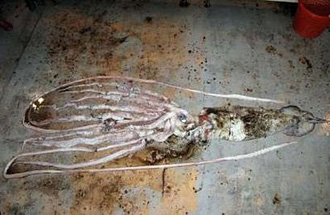
|  |  |  Editorials | Environmental | September 2009 Editorials | Environmental | September 2009  
U.S. Scientists Net Giant Squid in Gulf of Mexico
 Jasmin Melvin - Reuters Jasmin Melvin - Reuters
go to original
September 22, 2009


| | A giant squid collected by the NOAA on July 30, 2009 off the Louisiana coast in the Gulf of Mexico is seen in this handout. U.S. scientists in the Gulf of Mexico unexpectedly netted a 19.5-foot (5.9-metre) giant squid off the coast of Louisiana, the Interior Department said on Monday, showing how little is known about life in the deep waters of the Gulf. (Reuters/NOAA) |  |
Washington – U.S. scientists in the Gulf of Mexico unexpectedly netted a 19.5-foot (5.9-meter) giant squid off the coast of Louisiana, the Interior Department said on Monday, showing how little is known about life in the deep waters of the Gulf.

Not since 1954, when a giant squid was found floating dead off the Mississippi Delta, has the rare species been spotted in the Gulf of Mexico.

The squid, weighing in at 103 pounds (46.7 kg), was caught July 30 in a trawl net more than 1,500 feet underwater as it was pulled by a research vessel.

The giant squid, which did not survive the rapid change in water depth when brought to the surface, was preserved and sent to the Smithsonian Institution's National Museum of Natural History for further study.

Scientists aboard - from the National Oceanic and Atmospheric Administration and the Interior Department's Minerals Management Service - were participating in a pilot study on the diets of sperm whales.

"As the trawl net rose out of the water, I could see that we had something big in there ... really big," Anthony Martinez, a marine mammal scientist for the National Oceanic and Atmospheric Administration and the chief scientist on the research cruise, said in a statement.

Remnants of giant squid have been found in the stomachs of its predators in the waters of the Gulf, Caribbean and Florida Keys so scientists were aware of their presence in the Gulf.

The squid discovered by the researchers is significant because the species are difficult to catch, leaving much to be learned about them.

Michael Vecchione, director of NOAA's Fisheries Service's National Systematics Laboratory, the squid was an important addition to the worldwide study of squids.

"This find illustrates how little we know about what is swimming around in the deep waters of the Gulf of Mexico," he said.

Giant squid, which can be 40 feet long, are usually found in deep-water fisheries, such as off Spain and New Zealand.

"This is the first time one has actually been captured during scientific research in the Gulf of Mexico," he said.

The joint NOAA-MMS pilot study responsible for the find is part of a two-year, $550,000 study to determine the abundance and diversity of the type of fish and squid that sperm whales seek as prey.

(Editing by Bill Trott) |

 |
|  |



